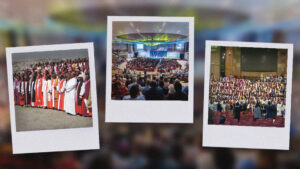There’s almost nothing so beautiful as forgiveness. Botham Jean was killed in 2018 in his apartment by an off-duty police officer who thought he was an intruder. The courtroom scene where the police officer received forgiveness from Jean’s brother brought tears to many eyes.
But where many saw beauty, others seethed with anger. Some saw another example of African Americans forgiving their oppressors when they should have been demanding change. A similar drama played out after the Charleston shooting by a white supremacist in 2015.
Must we choose between forgiveness and justice? Does forgiveness merely empower abusers?
Enter Tim Keller in his latest book, Forgive: Why Should I and How Can I? The best-selling author and co-founder of The Gospel Coalition doesn’t neglect the cost of forgiveness. He writes, “Forgiveness is always a form of voluntary suffering that brings about a greater good.” Sometimes that greater good accrues to the one who forgives. Forgiveness may feel like an optional exercise, but only if we don’t consider the alternative. Keller writes: “If you don’t deal with your wrath through forgiveness, wrath can make you a wraith, turning slowly but surely into a restless spirit, into someone who’s controlled by the past, someone who’s haunted.”
Tim Keller joined me on Gospelbound to discuss what happens when a society doesn’t forgive, whether it’s ever OK not to forgive, the two stages of forgiveness, and more.
Transcript
The following is an uncorrected transcript generated by a transcription service. Before quoting in print, please check the corresponding audio for accuracy.
Collin Hansen
There is almost nothing so beautiful as forgiveness. Botham Jean was killed in 2018 in his apartment by an off duty police officer. We thought he was an intruder. The courtroom scene where she received forgiveness from Jane’s brother brought tears to many eyes, including my own. Were many saw beauty, other seeds with anger. Some saw another example of African Americans forgiving their oppressors when they should have been demanding change. Similar drama played out after the infamous Charleston shootings by a white supremacist in 2015. So the question is, must we choose between forgiveness and justice? And just forgiveness merely Empower abusers? Enter Tim Keller and his latest book forgive, why should I and how can I? The best selling author co founder the gospel coalition doesn’t neglect the cost of forgiveness. He writes this forgiveness is always a form of voluntary suffering that brings about a greater good and quote now sometimes that greater good accrues to the one who forgives. It may feel like an optional exercise, but only if we don’t consider the alternative calibrates this if you don’t deal with your wrath through forgiveness. Wrath can make you a Wraith, turning slowly but surely into a restless spirit into someone who is controlled by the past. Someone who’s haunted and quote, as good one Tim. Tim Keller joins me now on gospel bound to discuss what happens when society doesn’t forgive whether it’s ever okay not to forgive the two stages of forgiveness, and more. Thanks, Tim. Welcome back to gospel bound.
Tim Keller
Happy to talk to you about this.
Collin Hansen
Alright, Tim, you say that when a society doesn’t forgive, the results are horrifying. Do you see horrifying results in our society today?
Tim Keller
Well, yes, I mean, there’s no doubt that we’re more polarized. And I think a big part of that is a an unwritten unstated assumption that if you are really for justice, if you’re really for the right, you you really don’t forgive people, but you just you just stay outraged. You stay angry. In fact, a lack of anger is is is really seen as letting the other person off the hook, it’s really being less than committed to justice, it’s almost like to be angry, and to be for justice are almost the same thing. And if you’re not angry, then you’re really not committed to justice. And so that’s overtly stated on the right. On the left, I would say though, it’s almost been adopted by the right even though I don’t think they would like to agree. I don’t think they’d agree that they’ve been in a sense, captivated by a leftist ideology. But there’s no doubt that it people on the right, as you know, for example, right now, and let’s not go there, this is not really the subject of the book, are afraid of being trying to be winsome. They trying to be kind and nice. And they say that just that just plays into the hands of the people who are trying to take over the country and trying to destroy us. And so that’s not very far from the left saying you’re supposed to stay angry. You’re not supposed to be kind and understanding you have to stay angry or you’re not for justice. So, justice and forgiveness are seen as opposites now.
Collin Hansen
Yeah. So to be able to assuage your own anger, essentially.
Tim Keller
Yeah, the two secular approaches to forgiveness, when I call therapy, it’s in the book, by the way, let’s talk about therapeutic and when I call merited transactional, the therapeutic one is the one that you most heard about, and what most secular books that call to teach you how to forgive, let your anger go, let go of it. It’s all for you. It’s all like it’s not healthy for you to stay angry. And you need to let go and you need to get by, get get past it. And it’s there’s no real concern for the perpetrator. And there’s no real concern for society. You know, how it will. It’s all a matter of how can how can you have peaceful emotions. And that’s pragmatism. That’s not like it’s right or it’s wrong. It’s not like it’s valid or invalid. It’s like forgiveness is something that you need to you need in order to have peace of mind. That merited forgiveness is where it’s trans or transactional is where you demand I’ll forgive you if you change and only if you change and only if you change enough and grovel enough is show that you have really been, in some ways that you have suffered as much as you made me suffer. So merited forgiveness is where, you know, if you come and you have hat in hand and you do this and this and this and this, then I’ll forgive you. And again, that’s very pragmatic. And it is a way of, of basically demanding that you get a certain amount of both emotional and behavioral change on the on the part of the other person. And so yeah, I mean, I can just see why some people would say, if the forgiveness is, I’ll forgive you, if I see you suffer, too. And you’ve grovelled, and you’ve hate yourself, and you beat yourself up and you’ve done all this and you’ve made restitution, then, in a sense, you’re you’re paying the person back was was was ironic about merited forgiveness. And Martha Nussbaum, who’s a secular philosopher, a very prominent university bagger, I think, has written a couple of books against forgiveness, because the the forgiveness she sees in the culture is she says, Not really forgiveness, what you’re really saying, I’ll forgive you if you do this, and this and grovel with enough. And it’s really basically a way of paying a person back under the heading of forgiveness so that you don’t look like you’re being vengeful, but you actually are
Collin Hansen
The next question then, from your book, Forgive? Why should I and how can I? Why do you describe forgiveness as a test of our belief and understanding of the gospel?
Tim Keller
Well, the forgiveness that the Bible talks about is a forgiveness that I do think has two parts to it. Now, my departed, dear departed friend, David Palisson, wrote a book called good and angry, and he does a really good job in there to explain that there’s two aspects to forgiveness that the to two different verses, when you read them at first, they seem to be contradictory. But when you bring them together, they give you a an approach to forgiveness, it’s based on the cross. It’s not the marriage of transactional forgiveness, we talked about where you’re basically paying the person back, but they grovel enough before you forgive them, and it’s not the therapeutic where you just do it for your own sake. Mark 1125 says that, Jesus says, if you’re standing and you, and you’re praying, and you realize you have anything against anybody forgive them. It doesn’t say, go to them or anything, just as forgive them on the spot. And yet, Luke 17, Jesus says, if a person comes in repents, you forgive them, and if they repent, seven times, you forgive them seven times. And that seems to be saying that you don’t forgive unless they repent. Now, what David Paulsen says is that unless you bring the two together, you fall into one mistake or another. The one mistake is you say you forgive that person, but then you don’t have to go to them and talk to them at all. It’s all something you do in your heart. On the other hand, you very often people say, you don’t have to forgive somebody unless they come to you. And what what David says is you internally forgive them first. So that you are saying, I’m going to go to them, but I’m not going to be trying to pay them back. I’m not going to be trying to make them gravel, I’m going to try to get them to see the truth out of out of love for them, and the honor of God. So you forgive them internally first, and then you seek to open their eyes and maybe even reconcile. And so he would call it internal forgiveness, and then external, relational forgiveness where you’re trying to repair. And that way you have on the one hand, you are concerned about justice, because you’re going to the person you want to say to us, do you really see that you’ve done something wrong, and you’re trying to get the person to change for their sake, for the sake of maybe other victims for God’s sake. But first, you’ve actually forgiven them already in your heart. Now, I think that ability to both forgive and to seek justice at the same time, proves that you have really understood what happened on the cross because on the cross Jesus Christ, satisfied the justice of God, and yet at the same time, procured our mercy and grace and salvation at the very same moment. In a nutshell, you both forgive and seek justice, just as on the cross Jesus Christ, both forgave and fulfilled justice. And it’s fascinating that in the world, you either have a therapeutic approach to to where you are just forgiving in order to help yourself or the transactional approach where you’re really not forgiving them but just forcing them to grow. Or the idea that no, I can It forgive it all. I just have to seek justice. Right? Only the cross it brings those together.
Collin Hansen
Yeah. Well, let’s let’s continue on that theme. Why do you say that forgiveness is granted before it’s felt, at least sometimes, because I can imagine that someone might say that that view is prone to abuse. But I’m guessing you’re trying to push back against a therapeutic, self centered motivation for forgiveness.
Tim Keller
Yes, to say forgiveness is granted before its felt means forgiveness is a promise that you can make even when you stay angry. So in other words, most people feel like to feel forgiving means my anger is going away. And I’m saying you can grant forgiveness before your anger goes away. If you promised to do three things. I put this in the book, I promise not, for example, to throw this up in the person’s face. If I forgiven them, I’m not going to every time I see them, throw it up to them. Secondly, I’m not going to be throwing it up to other people trying to draw their you know, trying to hurt their reputation. So I’m not going to bring it up to you. I’m not going to keep bringing it up to other people, the thing you did, and I’m not going to keep bringing it up to myself, I’m not going to constantly thinking about it. Now, that doesn’t mean I won’t notice. Remember it, but then I’m not going to dwell on it. And I found that if I say, for example, if if I want to forgive my wife, or if she wants to forgive me for something we just did, then we don’t throw it up in the other person’s face a week later or two weeks later. We certainly don’t talk to other people about it. And we don’t dwell on it ourselves. And if I do that, if I grant forgiveness, then eventually I find that I feel forgiving. But if you wait to feel forgiving before you grant forgiveness, you may never feel forgiveness.
Collin Hansen
I’ve recently for another project, read back through everything that you’ve done. And a lot of your books feel very consoling. They’re just straight. They’re good news. This one actually struck me as maybe your most demanding book, you’re really relaying some difficult teaching for especially some contemporary Western culture, difficult teaching from Jesus. And it really there’s no effort to try to explain it away at all. Do you think that’s a fair impression of the book? Or? Or did you have a different one?
Tim Keller
Well, I, I trust your judgment there because you have read a lot of my other books. And I think you’re probably right that this is a little more in your face, like you have to do this. Obviously, forgiveness sounds really nice. And way down the line. The fact that you have forgiven can bring a lot of fruit, but I do think that it’s a, I didn’t want to sugarcoat it. I think it’s it’s hard work. And I saw I didn’t
Collin Hansen
It just felt more explicitly countercultural without some sort of way to try to make it sound more palatable. It was I mean, here’s, here’s a bracing statement from the book. Here’s, here’s a quote, If you believe only in a God of love, you will live like a spoiled child. But if you believe only in a God of wrath, you will live like an abused child. I just addressed it. No, have you seen that dynamic play out over the year years among Christians?
Tim Keller
Interesting. You do know that I’ve always adopted Luther and actually reformed Protestant theology that says that the gospel is neither legalism or antinomianism. antinomianism is hacking live anyway. Want. Legalism is I’m just I’m terrible. I’m awful. It’s awful. a legalist is an abused child, who I felt like God is gonna get me I’m never good enough. And antinomian is a spoiled child. Like I can live the way I want to, because, you know, I’ve got, you know, God is just a God of love, and he’s going to take care of me no matter what, you know, that’s his job. It’s his job to love me and forgive me. And I actually have seen it a lot over the years. There’s a it’s kind of, frankly, it’s a reason why I constantly get charged with being a third way person because there’s legalism and antinomianism. But it’s also what is that that’s conservativism and liberalism, that’s secularism and religious people. And so I’ve seen it played out constantly. And in fact, I would say most people when it comes to God or either even look at on the internet is your the angry right wing types, and the angry left wings like the end The Left wing types are abused children and they were in the church. And they finally said, you know, I’m mad as you know what, and I’m not taking it anymore. And whereas the people on the inside in many ways, is another way to look at it. Oh, a Colin and that is that the people who feel like they are living up to the standards? They are not spoiled children. They are like, the oldest child, I’m the oldest child, are you an oldest child? Yeah. Well, you know, always children get very self righteous, they feel like we’re the ones that are obeying the parents. And we look down at our younger siblings who are are playing with it. And so you either are there are self righteous, older children, there are abused children. There are spoiled children. But I do you think the gospel doesn’t make you any of those? So yeah, I’ve seen it played out all the time, constantly.
Collin Hansen
Is it more of a region of the country? Or is it more person to person? I mean, of course, one of the fundamental dynamics of your career is the contrast between hope well in New York.
Tim Keller
Yeah. Now, it’s not that simple. It’s not as simple as regen. Now, you know, the old the prodigal son sermons prodigal God book, talks about older brother younger brother and the elder brothers, the legalist, the younger brothers antinomian, the older brother is the self righteous or the, you know, the, you know, the younger brother is the is the licentious one. And you think you come to New York, you have many younger brothers. And it’s true, by the way, that there’s an awful lot of younger siblings who moved to New York from more traditional families and the in traditional, very often the older children stayed home. And were true to the parents values. And the younger children very often went off, I did see some of that, but it’s just, it’s, it’s no, it’s not that simple. You can be very, you can be a self righteous progressive, by the way, a lot of people are, and there’s a lot of that in New York.
Collin Hansen
Well, I remember you saying that a long time ago. And then for this other project, looking so much into New York history. I remember I remember realizing, well, of course, the The amazing thing about Redeemer is that it was the massive arts community and Wall Street. It wasn’t one or the other. Right. But I had to imagine a good number of those Wall Street folks were older than me, they might have still been the younger ones in the older ones stayed home, but I had to imagine many of them were classic climbers. strivers,
Tim Keller
at, you know, one time we did a an open forum on lavo M. And labo. M is talking about the, they were talking about the 19th century, but what you have is the bourgeoisie, the Bohemian, the bourgeoisie, the person who is middle class, or upper middle class, and who sticks by the rules and wears a suit and goes to work and the Bohemian is the person who is you know, wine, women and song and and, and art and, and not fitting in. And that’s what we did have I realized when I was preaching, I mean, I haven’t I did a lecture at the end of the the open forum, we had a bunch of opera singers go through and sing all the main pieces of lava lamp. And at the end, I said the story is pretty much the same thing as the story of the prodigal son and the older brother, the older brothers, the bourgeois prodigal son is like the Bohemian and I said in our own church, we have a lot of bourgeois people who came to New York to wear that suit and go in there and make the money and you know, it is not a hair out of place. And any of the rest of it, hundreds of you are came here to get rid of that and live in downtown and live in the artistic community. And so yeah, you see both in big cities, you see both the bourgeois and the Bohemian, the elder brother and younger, even if the bourgeoisie are secular, there’s still a kind of legalism,
Collin Hansen
same thing you found right in Babbitt’s feast, and Blixen story and character, dimension.
Tim Keller
Well, that’s character you are the aesthetic, the I’m reading, reading some of this stuff, the aesthetic, the ethical, and then what he calls the religious but we would call the gospel.
Collin Hansen
Got a few more questions here on forgiveness specifically, is it ever appropriate Tim, for someone to decline when a church leader tells them they must forgive?
Tim Keller
Well, you know, it depends on Yes,
Collin Hansen
probably not meant to be a gotcha question. But you can
Tim Keller
probably you do need to ask them, you need to ask the church leader. Please spell out what you mean by forgive before you say yes, that’s all maybe That’d be better. I was very impressed. And I’ve spent a fair amount of time in one of the chapters with Rachel den Hollander and other sex abuse activists explaining how especially in the 70s and 80s, from we can tell it’s still within our living memory as it were. An awful lot of churches told women especially, or young boys who were abused sexually they need to forgive.
Collin Hansen
Yeah, that’s where the question comes from.
Tim Keller
And, and if if that means what it often meant, and that is, you don’t talk to anybody about this, you don’t talk to the police about this, you don’t bring it up again. You in your heart, you let it go. And say this man is really, he’s really sorry. So you have to let it go. And of course, then he goes right back to being in the same position he was before because he said he was sorry, if that’s what it means to forgive meaning don’t don’t speak to anybody, never bring it up again, and just let the person go on. That wasn’t very good. That wasn’t, that was terrible. And therefore, and so you know, I won’t mention any names, but we definitely know a friends of ours who. And I, because I’m older than you call, I do remember the day in which I wouldn’t surprise me because there was a time when the evangelical world felt like, we’re competent to counsel ourselves. We don’t need secular therapists and secular, which you don’t actually you don’t need psychotherapy, I mean, you. I don’t mean to say that, that there’s a need for secular therapy, when it comes to these issues. But the idea was, you don’t go to any kind of outside the church authorities at all, even when, frankly, a law has been broken, even when sexual abuse, you know, is a crime or physical abuse very often not. Here’s another one, which of course, is that your women who are being abused by their husbands were told they need to forgive their husbands and just go. And so the idea I do remember the 60s 70s and 80s, when evangelical churches would say, we can cut, we can handle this, we do not go to sexual secular authorities and that included, that included the police. So I do remember when that I’m very fortunate, I guess I was never tested at that point. But I was fortunate that I was never put in a position where I needed to. I don’t know what I would have done when I was a brand new Christian minister. Because I was to some degree, I think under under that, that mindset, that you don’t need to go to secondary authorities. So a lot of people did that. They said forgive meaning don’t go to the authorities when a crime has been committed. And that’s wrong. Totally.
Collin Hansen
Well, I think that’s part of what makes this book so urgent and helpful, but also potentially confusing for some people. Now, the book itself is not confusing, but the topic is, while you’re writing on it, we know that forgiveness has been often weaponized by church leaders as a way of silencing critics as a way of, of sentencing victims back to their abusers. And it’s, um, and it seems to me one of the more heinous abuses of the gospel that there is that we can be set. Okay, Forgiveness means? And I don’t know, I don’t know, Tim, if it was always, was it naivete? Or was it actual further abuse of authority of somebody saying, Hey, your husband’s been sexually abusing your children. But he seems really sad about it. Now. You wouldn’t want to take your husband and father away from his kids. So just forgive him. And let’s assume this is going to be, you know, okay, going forward, because he was really he really feels really bad about this. I don’t know if it was naivete, or if it, you know, because they didn’t understand the dynamics of sexual abuse. Or if it was an effort to try to cover up, I don’t know, I can’t put myself in that situation.
Tim Keller
And you’re right. No, no, no, I mean, I, it would have been both, because on the one hand, it definitely was a naivete about, about how sin works, and about how sexual abuse works. And the idea that a person could just repent. I mean, back in those days, for example, I think they realized that if a person was an alcoholic, they couldn’t just repent and say, I’m sorry, change and not need extensive help, and not be in a position of addiction where they really have lost the ability to exercise their own volition, I think, in the 60s and 70s, that was understood when it came to drugs and alcohol, but not yet sex. I don’t think in spite of the fact that sex is a physical thing. The sexual arousal and all that is it’s a physical thing. And so I think that was part of it, but I absolutely I must say that That That’s naive. And that was, you might say that’s a little bit more excusable, but it’s not. There, there definitely was a desire just to sweep things under the rug and not deal with the reputational.
Collin Hansen
And also a hope that maybe in some cases, there could be restoration or the family could stay together. I’m sure there was some aspect of that, too. But it’s interesting that you contrast it with alcohol, because that was widely recognized as a huge problem for the same reasons. By the mid to late 19th century. So that was just at the forefront of Evan Jellicle. And even broader Protestant ethics for a I mean, so of course, the origins of prohibition, but it was a lot of the same dynamics. Husbands drunk comes home, beats wife apologizes when he sobered up in the morning. Oh, he feels really bad about it, no big deal. And then, of course, it just keeps repeating. So maybe I don’t know why there wasn’t a recognition of some of the other dynamics. But you’re right, there was about 100 year head start of recognizing the problems and those dynamics with alcohol abuse.
Tim Keller
Well, I had to say, though, that alcoholism wasn’t was not as bigger. Alcoholism was not as shameful as this. Alcoholism was bad. Okay. But this was this reason why this one, they wanted to sweep this under the rug? I’m sure I see. Okay. Sure that so when you say what percentage I don’t know. I don’t think we should hide behind the night. There was definitely a naivete, no doubt about it. I, I experienced some of it. It took me a while to realize just how, you know, just with pornography, for example. And when we you know, auto eroticism as a as a counselor, as a pastoral counselor, you deal with men who have a pornography habit. And certainly when I was in my 20s, and 30s, I was kind of naive about how easy it was to for them to stop. Again. Wow. You know, they seem to be really repentant, really sorrowful. I don’t think they’re kidding me. They weren’t lying to me if they just can’t seem to stop. So I mean, I it, it slowly dawned on me as I got older that this is something that is both. They are responsible for it, it’s so wrong. At the same time, they’re, they’ve given away their ability to get control. I think there’s some place where Lewis says that when you get to the place where you are drunk, you no longer have control. And yet, it’s not. You’re not innocent, because in a way, you gave away that control bit by bit by bit, and you knew what you were doing. But by the end, you couldn’t do anything about it. And that’s one of the things that happens with with addiction is in the beginning, you do it and you are responsible for it. But then when it eventually you are no longer able to stop it. It’s just going on. And then you need a whole lot more massive intervention. And then you got to remember the victim. The other point is I think the other thing where people were naive about it was the idea that victims could forgive and not be traumatized by it.
Collin Hansen
That it would Yeah, that it would go away. That it wouldn’t linger.
Tim Keller
The victim would be forgiven forget. Yeah, that was that was also tremendous naivete.
Collin Hansen
Right. Two more questions here on forgive. Why should I and how can I latest book from Tim Keller. I’m gonna summarize one of your observations, Tim of the spiritual but not religious category of folks, big group and Western society this way, you say that they want forgiveness for me but punishment for the I was wondering why this contradiction isn’t more obvious. Something in our culture, human nature, because it seems transparent, that forgiveness can’t work that we always expect other people to forgive us, but not have to forgive back or expect others be forgiven. If there are enemies.
Tim Keller
Not everybody’s like that. I mean, actually, one time I was counseling a couple. And the wife had had an affair. And when another man and the husband was surprisingly forgiving, I thought, until it came out that he’d actually had an affair that he hadn’t told us about earlier. And one of the reasons why he was so forgiving was because he knew.
Collin Hansen
I knew he knew he was going to need that play that car right.
Tim Keller
Now. I think that, frankly, is as bad as that was. I think he’s a little he was more reasonable. I mean, in other words, he the, the fact that he knew he was had sent himself humbled him. Yeah, he was able to forgive his wife when she found out about it. You know, for a moment of course, she flared up and then she said, All right, well, what you know, how can I be? How can I get on my high horse? It was pretty it was Same. On the other hand, there are people, what I’m trying to say there is there definitely are people who they will be all after other people if they’ve sinned. And yet, as soon as they do something wrong, they just want forgiveness. And I think those are people that are really out of touch with moral reality, and the human heart. But I do see a lot of that. And I think those people are, you know, they are far from the kingdom.
Collin Hansen
Last question on the on the book, you know, it’s interesting, Tim, I didn’t sense much of your personal experience with this subject. In the book, it’s, you know, it’s a very personal topic, but it must have been a conscious choice on your part, to not use much personal narrative in it. And you use personal narrative in a number of your books, not as much as some people. I’m also interviewing Scott Saul’s this season, Scott has a very different, different writing style, much more personal style, but would you describe yourself as quick to forgive? How do you see yourself in this?
Tim Keller
I’m a peacemaker, because I’m an oldest child. And maybe that’s not the only reason. But I am. A little too, I would say if I’m a little too quick to forgive, and then not confront, okay. Others are too quick to confront and not really forgive. Remember, that’s David Paulsen said, you’re supposed to both forgive, and then confront out of that forgiveness so that you’re now no longer going after them, and confronting them for vengeance, but for just for their sake. If you don’t forgive, you’re going to confront them for your sake, if you do forgive that you can confront them for the Lord’s sake and their sake. That’s the idea. And I would say that, that whereas I have not had a problem in forgiveness, forgiving other people who have wronged me, that hasn’t been a big issue, though, my bigger problem has been more on the going to people and saying, you know, you did something wrong. Somehow, I don’t know that that I guess I probably had a couple places where I could have stuck that in there. It would, it would have been easier if I had a good narrative about saying this is something that it was done to me. And this is how I was so angry, and this is how I got out of it. That’s a much more compelling story, then to say I ordinarily tend to chickened out when people wronged me and not tell them about it. And I don’t know that just didn’t call it it just, it didn’t feel like that was all that helpful. Now, you might say, well, you’re, you’re also covering up your sin. That’s true, perhaps. But I also that’s the I could have said that, and maybe I shouldn’t have and now I have you got to say it on this podcast. That’s my I’m that of the what the Bible says about forgiveness. That’s the part that I have a tendency not to do and I think most of us it’s one or the other is a problem. Well, I
Collin Hansen
again, having having studied through study through your life, I assumed that that was that was how you would answer that you do tend to be by nature, and by Grace more quick to forgive. I hadn’t thought about the confrontational dimension, but I also was not aware of any kind of you mentioned Rachel den Hollander in here, I was not familiar with some sort of Rachel den Hollander kind of situation that you could have used to illustrate. And it’s probably more similar to I mean, you have especially more recently in life, you’re walking with God through pain and suffering book, of course, you bring in all the other narratives in there to be able to to advance those arguments. And you have a little bit more of that acquaintance with that. Those aspects of grief. But
Tim Keller
I had cancer twice. Right. And, on the other hand, that’s, you know, that’s I was still see that as garden variety human suffering, but it’s hard. Yeah. So I’ve had my experiences there. But when it comes to forgiveness, it’s more of a I tried to put in there the kind of incentives for talking to people and not just letting it go. But don’t forget this to Colin right now. The culture is going in the direction of what’s confirmed, just confront, but not forgive. Yeah, not forgive, and therefore I wasn’t, I wasn’t really speaking so much in his book, to an audience I felt that was afraid of confronting. The younger people are, are much much, you know, they’re willing to to lodge their complaints and go after people and in a way that just wasn’t true, you know, years ago, where you just didn’t make waves. You know, that’s the, that’s the way it was. And I’ve
Collin Hansen
noticed also in your writing that it’s, it’s very true perspectival and there’s a strong situational dimension to this. So I mean, you just, I was just thinking about how you handle the different dimensions so well, but there’s a wrong sense of writing for this moment is still timeless. And it’s biblical and pastoral wisdom, but it’s also very much at a moment at your introduction covers where there’s a lot of confrontation. Thank you to social media and other venues for that. But anyway, well, we’ve been talking with Tim Keller about his new book forgive, why should I and how can I? One last question off the script. Tim, what’s the last great book you’ve read?
Tim Keller
I’m reading a book right now that’s almost done by a couple that looks like they’re married to each other. And they both teach it at Furman. It’s okay. And I forgotten their first names, but it’s called why why we are restless. Okay. It’s a Princeton University book. It’s a you know, so it’s an Academic Press, but it’s really accessible. And it’s looking at for French thinkers, it’s really looking at Montaigne, Pascal was so and what was the fourth one was? It’s just like, I’m only halfway through the book.
Collin Hansen
It hasn’t gotten to him yet.
Tim Keller
No, wait a minute. Wait a minute. And well, there we are. Anyway, last great book, and he doesn’t remember. I’m halfway through it. And when it’s the very, very, very most recent book, it’s a book by two people that feel to me like they might be Catholic. Christians, I’m not sure who the authors are. However, it’s a really good book on what they call philosophical anthropology. You know, what, what are human beings? For and what satisfies us? So it’s a it’s a book on? How do you find contentment and happiness for a secular audience? Just a really, really good book. Why we are restless. So take a look at it. I think it’s awesome. Believe it or not pretty fast read.
Collin Hansen
There you go. Another recommendation on top check out Tim Keller’s new book forgive. Why should I and how can I? Thanks, Tim. You’re welcome.
Collin Hansen serves as vice president for content and editor in chief of The Gospel Coalition, as well as executive director of The Keller Center for Cultural Apologetics. He hosts the Gospelbound podcast and has written and contributed to many books, most recently Timothy Keller: His Spiritual and Intellectual Formation and Rediscover Church: Why the Body of Christ Is Essential. He has published with the New York Times and the Washington Post and offered commentary for CNN, Fox News, NPR, BBC, ABC News, and PBS NewsHour. He edited Our Secular Age: Ten Years of Reading and Applying Charles Taylor and The New City Catechism Devotional, among other books. He is a member of Iron City Church in Birmingham, Alabama, and he is an adjunct professor at Beeson Divinity School, where he also co-chairs the advisory board.
Tim Keller (MDiv, Gordon-Conwell Theological Seminary; DMin, Westminster Theological Seminary) is founder of Redeemer Presbyterian Church (PCA) in Manhattan, chairman of Redeemer City to City, and founder of The Gospel Coalition. He has written numerous books, including The Reason for God. He and his wife, Kathy, have three children.































